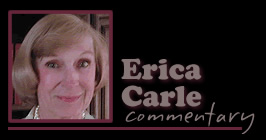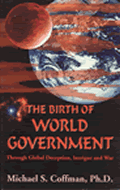Other Carle Articles:
Government
Religion In The
United States
The
Chamber Of Commerce:
It's Power And Goals
Control The Environment To Control Humanity
Universal Brotherhood And The Drive For World Unity
LUDWIG von MISES AND THE SCIENCE OF EVERYTHING
Erica
Carle
September 23, 2007
NewsWithViews.com
Austrian born economist, Ludwig von Mises (1881-1973) went too far. He claimed too much. The very title of his best known book, Human Action is testimony to his overly ambitious claim. Economics, he believed, ought to be treated as the science of everything--the science of all purposeful human action. He wrote:
The general theory of choice and preference. . . is the science of every kind of human action. Choosing determines all human decisions. In making his choices man chooses not only between various material things and services. All human values are offered for option. All ends and all means, both material and ideal issues, the sublime and the base, the noble and the ignoble, are arranged in a single row and subjected to a decision which picks one thing and sets aside another. Nothing that men aim at or want to avoid remains outside of the arrangement into a unique scale of gradation and preference. The modern theory of value widens the scientific horizon and enlarges the field of economic studies. Out of the political economy of the classical school emerges the general theory of human action, praxeology. The economic or catallactic problems are embedded in a more general science, and can no longer be severed from this connection. No treatment of economic problems proper can avoid starting from acts of choice; economics becomes a part, although the hitherto best elaborated part, of a more universal science, praxeology. 1-P3.
Von Mises called himself a liberal, but a great many conservative and libertarian scholars, businessmen, and elected officials consider him their economic guru. This is easy to understand since conservatives and libertarians, whether they read his books or not, believe von Mises made an admirable case for private property, capitalism as opposed to communism and socialism, free trade, and for a minimum of governmental interference with business. He wrote:
At no time has there ever been a people which has raised itself without private property above a condition of the most oppressive penury and savagery scarcely distinguishable from animal existence. 2. P 61
Either private ownership of the means of production, or hunger and misery for everyone. 2. P88
But he also wrote:
It is not because of property owners that liberalism favors the preservation of the institution of private property. It is not because the abolition of that institution would violate property rights that the liberals want to preserve it. If they considered the abolition of the institution of private property to be in the general interest, they would advocate that it be abolished, no matter how prejudicial such a policy might be to the interests of property owners. 2. P30
Well then, what was von Mises? Was he a liberal, or was he not a liberal? What did the term liberal mean to him?
Liberalism is not a completed doctrine or a fixed dogma. On the contrary: it is the application of the teachings of science to the social life of man. 2. P3.
What science?
Liberalism is derived from the pure sciences of economics and sociology. . .2. P88
One cannot understand liberalism without a knowledge of economics. For liberalism is applied economics; it is social and political policy based on a scientific foundation. 2. P195
Did von Mises' conception of liberalism have a goal?
The ultimate ideal envisioned by liberalism is the perfect cooperation of all mankind, taking place peacefully and without friction. Liberal thinking always has the whole of humanity in view and not just parts. It does not stop at limited groups; it does not end at the border of the village, of the province, of the nation, or of the continent. Its thinking is cosmopolitan and ecumenical: it takes in all men and the whole world. Liberalism is, in this sense, humanism; and the liberal, a citizen of the world, a cosmopolite. 2. P105-106
Does this mean von Mises had no respect for national boundaries and national sovereignty? Did he mean world government?
For the liberal, the world does not end at the borders of the state. In his eyes, whatever significance national boundaries have is only incidental and subordinate. His political thinking encompasses the whole of mankind. The starting point of his entire political philosophy is the conviction that the division of labor is international and not merely national. He realized from the very first that it is not sufficient to establish peace within each country, that it is much more important that all nations live at peace with one another. The liberal therefore demands that the political organization of society be extended until it reaches its culmination in a world state that unites all nations on an equal basis. For this reason he sees the law of each nation as subordinate to international law, and that is why he demands supranational tribunals and administrative authorities to assure peace among nations in the same way that the judicial and executive organs of each country are charged with the maintenance of peace within its own territory. 2. P148.
Would liberals allow groups of inhabitants to withdraw their territory from one country to join another?
The right of self-determination in regard to the question of membership in a state thus means: whenever the inhabitants of a particular territory, whether it be a single village, a whole district, or a series of adjacent districts, make it known, by a freely conducted plebiscite, that they no longer wish to remain united to the state to which they belong at the time, but wish either to form an independent state or to attach themselves to some other state, their wishes are to be respected and complied with. This is the only feasible and effective way of preventing revolutions and civil and international wars. 2. P109
Did von Mises believe that the supranational tribunals and administrative authorities should be subject to any religious, moral or political restraints?
Praxeology and economics deal with the means for the attainment of ends chosen by the acting individuals. . . They apply to the means only one yardstick, viz., whether or not they are suitable to attain the ends at which the acting individuals aim. 1. P95.
All moral rules and human laws are means for the realization of definite ends. There is no method available for the appreciation of their goodness or badness other than to scrutinize their usefulness for the attainment of the ends chosen and aimed at., 1. P. 720.
Von Mises frequently repeated this thought about the usefulness of the means . It seems to me that this is just another way of saying that the end justifies the means. To him religious and moral restraints were obstructions that needed to be eliminated since they interfered with to the formation of international economic and political policy. He wrote:
Liberalism limits its concern entirely and exclusively to earthly life and earthly endeavor. The kingdom of religion, on the other hand, is not of this world. Thus, liberalism and religion could both exist side by side without their spheres' touching. That they should have reached the point of collision was not the fault of liberalism. It did not transgress its proper sphere, it did not intrude into the domain of religious faith or of metaphysical doctrine. Nevertheless, it encountered the church as a political power claiming the right to regulate according to its judgment not only the relationship of man to the world to come, but also the affairs of this world. It was at this point that the battle lines had to be drawn. . . .
If one considers the peaceful cooperation of all men as the goal of social evolution, one cannot permit the peace to be disturbed by priests and fanatics. Liberalism proclaims tolerance for every religious faith and every metaphysical belief, not out of indifference for these "higher" things, but from the conviction that the assurance of peace within society must take precedence over everything and everyone. And because it demands toleration of all opinions and all churches and sects, it must recall them all to their proper bounds whenever they venture intolerantly beyond them. 1. 55-56
Von Mises offered values clarification as an alternative to Biblical Christianity and its moral instruction.
Science's contribution to life and action does not consist in establishing value judgments, but in clarification of the conditions under which man must act and in elucidation of the effects of various modes of action. It puts at the disposal of acting man all the information he needs in order to make his choices in full awareness of their consequences. It prepares an estimate of cost and yield as it were. 1 P. 174.
Values clarification is what the National and the Wisconsin Councils for the Social Studies insisted that children be taught in school. Before values clarification can effectively influence children's thinking, the behavioral and moral teachings of their parents and churches must be challenged. When this is done inexperienced and uninformed children must make up their own moral code which means choose their values, and if possible, act on them. They are offered absolutely no protection against slovenly, immoral, vicious, and criminal behavior. They are denied the Ten Commandments, the teachings of Jesus, and the experiences of past centuries.
A child generally comes to school with what R. J. Havighurst calls an authoritarian conscience acquired from his parents through a progression of punishments and rewards. He soon learns that he is not equipped to deal with all the new situations which confront him. Peers and teachers join and sometimes supplant parents in helping him to find solutions which are often in conflict with those offered by his parents. His task, then, is to change from this early authoritarian conscience to a rational one. . .
Because values occupy their central position in the value-attitude-belief system, education can most effectively influence the behavior of students by influencing the values they hold. 3. P. 43.
We assume, however, that the perceptive, thoughtful teacher will, if he adopts the suggestions given here, influence the student's values, his understanding of the nature of values, and the valuing process he uses. 3 P. 44.
Traditionally there was little question that the school should promote such values as the following:
1.
Respect property,
2. Be respectful of adults,
3. Say please and thank you at appropriate times,
4. Do not use profane language or bad grammar,
5. Be neat and clean,
6. Do not lie or cheat.
Now, however, in some situations these are quite controversial. Many lawsuits and community controversies have focused on the meaning of 'neat and clean', for example. Several recent surveys indicate that cheating in school, rather than being unacceptable, has become the norm, and most students feel no guilt about cheating. Standards of profanity are constantly changing and words that one rarely heard used in public a few years ago are now heard a great deal. While many may not like these developments, it is very necessary for teachers to recognize that they are taking place. 3. P. 45.
By claiming the whole field of human action for economics Von Misses intruded on general education, moral philosophy, religion, psychology, natural sciences, government, and even personal friendships and family relationships. If economic theory includes all of these areas, applied economic theory becomes an all-encompassing effort to become the philosophical, religious, psychological, political and personal compass for all human action. Those who call themselves social scientists become our rulers. Legislators, judges, and national leaders cannot be guided by constitutions or by the will of the people. We must then forget self government in both our personal and our public lives because it is not deemed by social scientists to be scientific. Social experiments involving citizens and financed by government, such as busing children away from their homes and neighborhood schools, are permitted because social science must test its theories.
In the final paragraph of Human Action , Von Mises wrote:
The body of economic knowledge is an essential element in the structure of human civilization; it is the foundation upon which modern industrialism and all the moral, intellectual, technological, and therapeutical achievements of the last centuries have been built. It rests with men whether they will make the proper use of the rich treasure with which this knowledge provides them or whether they will leave it unused. But if they fail to take the best advantage of it and disregard its teachings and warnings, they will not annul economics; they will stamp out society and the human race. 1. P885.
How is that for intimidation? If Von Mises were still with us, I would reply:
Ludwig, we have no desire to annul economics or stamp out the human race. We know that there are economic truths. We appreciate those who share them with us. But we also know that it is impossible to live in peace with those who trade Biblical teachings for values clarification and self chosen values which could include lying, stealing, cheating, and bullying to reach a social or personal goal.
|
Subscribe to the NewsWithViews Daily News Alerts! |
Much of what you have taught is true and useful. However economic knowledge that is true and useful was known long before social science as a religion and a controlling force was birthed by August Comte in the mid 1800's. There is no need to force us into a world system. We can trade with people of other nations as friends and neighbors. So stop trying to frighten and intimidate us and our elected representatives, judges, and national leaders with the threat that if we do not support world government and unrestricted immigration we will stamp out the human race. Ludwig, you claim too much. There is no science of everything.
Footnotes:
1.
Ludwig von Mises, Human Action, Third Revised Edition, Henry Regnery Company,
1966.
2. Ludwig von Mises, The Free and Prosperous Commonwealth, An Exposition
of the Ideas of Classical Liberalism, Translated by Ralph Raico, D. Van
Nostrand Company, Inc., 1962.
3. Knowledge, Processes and Values in the New Social Studies, Wis.,
Dept. of Public Instruction Bulletin #185 1st edition, 1964, Revised,
1967.
� 2007 Erica Carle - All Rights Reserved
Erica Carle is an independent researcher and writer. She has a B.S. degree from the University of Wisconsin. She has been involved in radio and television writing and production, and has also taught math and composition at the private school her children attended in Brookfield, Wisconsin. For ten years she wrote a weekly column, "Truth In Education" for WISCONSIN REPORT, and served as Education Editor for that publication.
Her books are GIVE US THE YOUNG--$5 Plus $2.00 P&H WHY THINGS ARE THE WAY THEY ARE--$16 PLUS $4.00 P&H BOTH BOOKS -- $25 Total. A loose leaf collection of quotes titled, SIX GENERATIONS TO SERFDOM is also available--$15 Plus $2.00 P&H. Mailing address: Erica Carle; PO Box 261; Elm Grove, WI 53122.
E-mail: ericacarle@sbcglobal.net
Values clarification is what the National and the Wisconsin Councils for the Social Studies insisted that children be taught in school. Before values clarification can effectively influence children's thinking, the behavioral and moral teachings of their parents and churches must be challenged.












